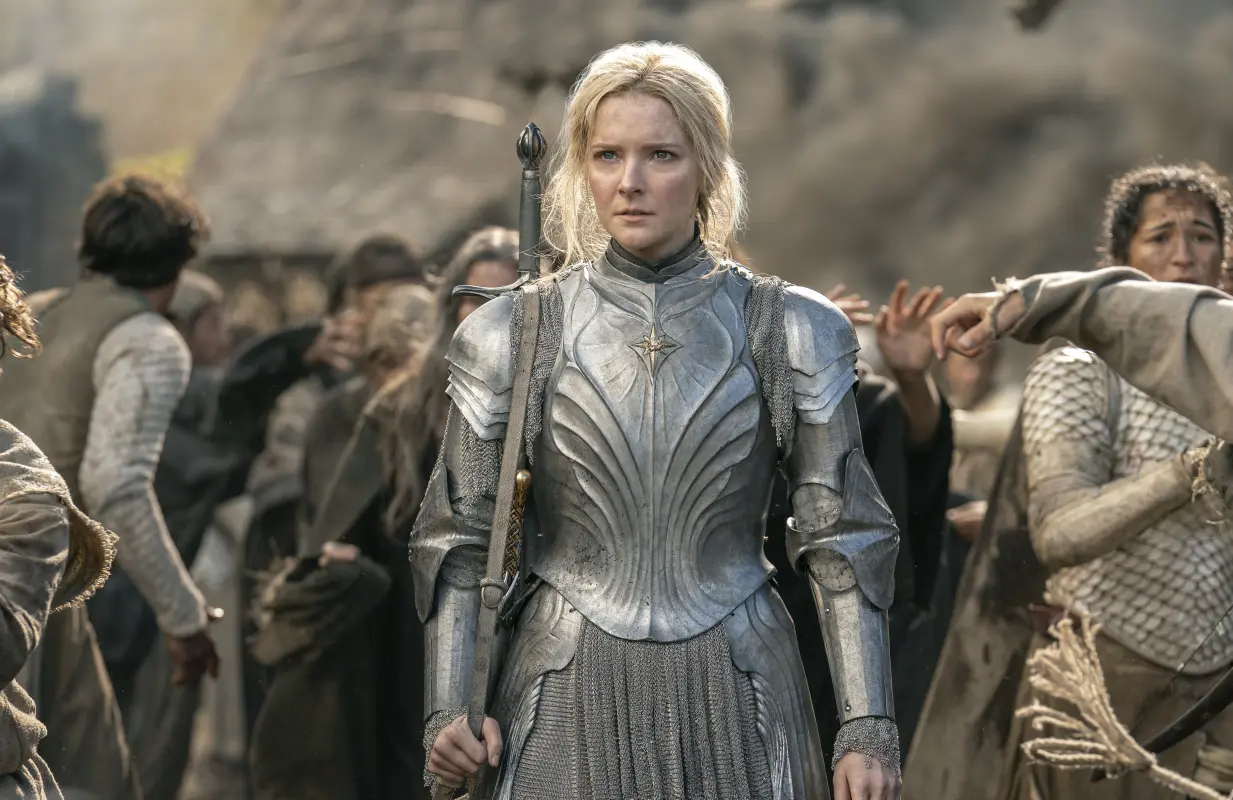In Rings of Power, Galadriel Is Finally Adding Some Feminism to The Lord of the Rings
-
 Morfydd Clark as Galadriel (Photo: Matt Grace/Prime Video)
Morfydd Clark as Galadriel (Photo: Matt Grace/Prime Video)In episode three of Prime Video’s The Lord of the Rings: The Rings of Power, Galadriel speaks to Míriel, the Queen of Númenor. That’s notable not just because it introduces the audience to one of J.R.R. Tolkien’s most spectacular locations, but also because it reminds us that on this series, female characters actually talk to each other.
This hasn't always been the case in the Rings universe. Just watch the supercut that a YouTuber made of all the times female characters exchange words in Peter Jackson’s Lord of the Rings films. It’s very short, and that’s largely because in the movies, there are only three notable female characters. Three. In over nine hours of screen time.
Meanwhile, in Rings of Power, there have been eight female characters introduced so far, many created specifically for the show. In fact, the main character is arguably the elf Galadriel (beautifully played by Morfydd Clark), who has given Lord of the Rings a welcome dose of feminine energy.
The Galadriel that appears in Rings of Power is different from the one who appears in Tolkien’s books. For one, she is seen in the first episode single-handedly taking down a troll. And while in the books she is married and mostly on the periphery of the action, in the series she is single and on a quest to stop Sauron.
It would have been easy for Rings of Power, which is based on a history of Middle-earth that Tolkien appended to his novels, to keep her on the sidelines. After all, the original text is basically about Sauron tricking a whole lot of male Elves into making him some jewelry. Women play supporting roles. Sure, they get to kill a Witch King and say epic lines like, “All shall love me and despair!” But they aren’t the heroes. They’re not the ones going on quests.
By putting a female character at the center, Rings of Power lets her drive the story. In the series, Galadriel is allowed to be more than the perfect, ethereal being that she is in the original trilogy. She is stubborn and rebellious, convinced that she is right even when everyone else is telling her to give up. She is caring and tender, but she isn’t always likable; Míriel almost throws her in prison when they meet.
Galadriel is also not given the storytelling crutches usually reserved for female characters, such as a child or a love interest. Instead, she’s driven by her sense of righteousness and vengeance. In other words, Galadriel is written like she’s a man — with much better hair.
This might be why the series has been criticized by a toxic subset of fans, with Elon Musk even chiming in on Twitter: “Tolkien is turning in his grave. Almost every male character so far is a coward, a jerk or both. Only Galadriel is brave, smart and nice.”
It’s not clear that Musk has even watched the show. Galadriel isn’t actually all that nice, for one thing, and a male character like Arondir (Ismael Cruz Cordova) isn’t a coward. (He recently killed an orc with a tree branch). But that tweet springs from an exhausting tradition. Women in fantasy are mostly fair maidens who give advice but don’t take action (like the original Galadriel), women driven mad by power (like Daenerys in Game of Thrones), or women destroyed by the patriarchy (like Queen Aemma in House of the Dragon). A woman who is confident in her convictions and sure in her power — and isn’t raped to move a story along— is more otherworldly than a Balrog.
Besides, those who oppose this new take on Galadriel need to brush up on their Tolkien. In the Unfinished Tales, which Christopher Tolkien published based on his father’s notes, Galadriel does pick up a sword; she is described as having “fought heroically” and “fought fiercely” in numerous elven conflicts. According to Tolkien, she’s also the smartest person in the room: “She perceived from the beginning that Middle-earth could not be saved from ‘the residue of evil’ that Morgoth had left behind him, save by a union of all the peoples who were in their way and in their measure opposed to him.”
Even though Tolkien never gave Galadriel her own adventures, he at least acknowledged that she was a badass, one who even scared Sauron. (We get a taste of this during an excellent fight scene in Jackson's third Hobbit film.)
The series, then, is finally enacting what’s only suggested in the source material, and because it has a five-season arc, we’re likely to see how Galadriel transforms from a hot-headed young elf to a calm, composed ruler. By giving her so much to do, Rings of Power is showing us how formidable she can truly be, while also giving Tolkien fans a heroine we can follow from beginning to end. That’s not wokeness: It’s good storytelling.
The Lord of the Rings: The Rings of Power premieres new episodes Fridays on Prime Video.
People are talking about The Lord of the Rings: The Rings of Power in our forums. Join the conversation.
Diep Tran is an arts journalist/editor based in New York City. Follow her on Twitter @DiepThought.
TOPICS: The Lord of the Rings: The Rings of Power, Christopher Tolkien, Elon Musk, J.R.R. Tolkien, Morfydd Clark
- No One At Amazon Seems to Know the Full Story About Studio Spending
- The Rings of Power and Other Big TV Swings Aren't Exactly Paying Off for Amazon
- The Lord of the Rings: The Rings of Power Sets All-Female Directing Team for Season 2
- The Lord of the Rings: The Rings of Power Season 2 — Everything We Know So Far